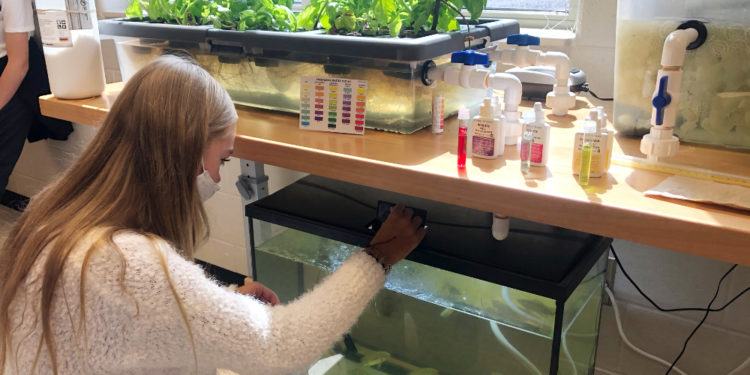STEM EDUCATION INNOVATION LAB PARTNERS WITH GWINNETT COUNTY SCHOOLS TO OFFER INNOVATIVE AGSTEM LEARNING EXPERIENCE

Despite challenges imposed by COVID-19, teachers in Gwinnett County’s Archer School Cluster are working to make science more exciting than ever this fall.
Through an innovative AgSTEM research project utilizing aquaponics and smart sensor technology, and with support from an interdisciplinary team of research faculty, Archer educators are being equipped with the tools and resources to teach every subject through the lens of urban agriculture and conservation.
Mercer University’s STEM Education Innovation (SEI) Lab, in collaboration with Gwinnett’s Soil and Water Conservation District (the District) and the USDA Natural Resources Conservation Service (NRCS) Lawrenceville District office, has engaged regional partners to implement agriculture-based science, technology, engineering and math (AgSTEM) in the Archer Cluster.
The District awarded Mercer $50,000 in funding to administer this initiative, led by Dr. Justin Ballenger and Dr. Elaine Thurmond, both faculty members in the University’s Tift College of Education. A portion of the funding supports graduate research fellowships for four Ph.D. candidates – Jami Friedrich, Stacey Young Rivers, Tynetta Jenkins and Caitlin Hochuli – in the College of Education.
“This was a phenomenal opportunity to help design and implement a program with experts in the field,” said SEI Lab Fellow Rivers. “SEI provided a valuable engagement for us to practically apply what we are learning at Mercer while leveraging our individual expertise to create a dynamic experience for educators.”
In collaboration with faculty, SEI Lab Fellows assisted in the creation of professional development sessions for Archer educators and are providing guidance and feedback for the AgSTEM curriculum under development in the cluster.
Partners at the University of Georgia’s Warnell School of Forestry, Clark Atlanta University’s Center for Innovation and Entrepreneurial Development, and the Department of Defense STARBASE-Robins program helped design the aquaponics kits as well as provide consultation and expertise.
“We anticipated funding a handful of aquaponics systems for schools interested in expanding their school gardening program,” said Tixie Fowler, district program assistant for the Gwinnett County Conservation District. “It made sense to offer the aquaponics kits with activities, but we noticed there was very little existing material. So we thought we’d engage a few teachers to help develop instructional material. What we didn’t expect was the incredible degree of excitement this idea would spark. The connections and resources that have jumped aboard are astounding.”
To implement the AgSTEM curriculum, Fowler and SEI Lab Director Dr. Ballenger invited administrators in the Archer School Cluster to participate in the K-12 pilot program. With their support and buy-in of their STEM teaching teams, the District equipped Archer’s five schools with aquaponics kits while UGA/Warnell provided tilapia and basil as the first crop.
Aquaponics is a farming method that connects aquaculture (i.e. fish production) to hydroponic plant growth in a circulating system that utilizes 90% less water than traditional growing methods. The fish provide water and nutrients to feed the growth of plants.
These systems will engage Archer’s elementary, middle and high school students in cross-curricular learning that supports grade-level academic standards while deepening student understanding of the science behind growing food. By building upon this experience all the way through high school, Archer educators envision a rich learning experience that connects academics to real, global issues like food security, resource conservation and human impacts on the natural environment.
According to Dr. Ballenger, aquaponics isn’t meant to replace school garden programs, but introduces an additional tool for teachers to integrate into what they are already teaching. Aquaponics will be a key component of Archer High School’s more than 2,000-square-foot educational greenhouse that is currently being constructed with funds from a Gwinnett County Public Schools Innovation Grant.
“A very large scale aquaponics system with two 1,000-gallon fish tanks and six 250-gallon tanks will be constructed in the greenhouse by our engineering students under our STEM coordinator’s supervision,” said Archer High Principal Ken Johnson. “The space will also allow for our environmental science and scientific research students to conduct ag experiments. All cluster schools will be using the greenhouse, which is super exciting.”
“Archer has embraced AgSTEM across the cluster,” Dr. Ballenger added. “They instantly recognized it as a value-add to their already impressive AgEd programs. Teachers are excited about the opportunity to engage students in real-world problem solving that involves agriculture and emerging computer technology. Teachers are currently organizing a cluster-wide farmers market that will support service-learning and community partnerships. This project will provide a valuable tool to support truly interdisciplinary STEM in the Archer Cluster.”
Along with aquaponics kits developed by experts at Mercer’s SEI Lab and UGA/Warnell, AgSTEM also incorporates state-of-the-art smart probes and a customized app designed to help students collect system data. Students will also learn about coding and robotics and eventually design agribots that can control the aquaponics systems. This smart technology is being provided by MantisEDU, an international, award-winning technology consulting firm based out of Decatur.
Clark Atlanta University has also partnered to support AgSTEM’s entrepreneurial learning. Challenging teachers to innovate using resources like business plan models, case studies and content authored by entrepreneurial thought leaders was imperative to helping educators understand how to turn their creative idea into a concept for service-learning.
Additionally, STARBASE Robins, a STEM enrichment program at Robins Air Force Base administered by the U.S. Department of Defense, is utilizing gaming technology to engage youth in STEM with embedded career goal-setting opportunities. STARBASE Robins joined the AgSTEM team to pilot its own expansion into agriculture-based learning and career promotion, planning to coordinate with AgSTEM objectives beginning this fall.
Archer’s STEM team leaders met virtually for four weeks this summer, led by Mercer’s SEI Lab team in collaboration with the aforementioned partners. Archer educators received online instruction on how to set up and maintain their new aquaponics systems and smart probes. They also teamed up offline to develop creative instructional strategies and design lesson materials.
“The AgSTEM professional development equipped teachers with strategies necessary to prepare the next generation of innovators to be successful in today’s challenging world. Teachers will be able to immerse all students in hands-on inquiry and open-ended exploration that is generally offered to gifted students,” said Dr. Thurmond.
About the Archer Cluster
The Archer Cluster of schools is one of Gwinnett County Public Schools 19 clusters. It includes Archer High School, McConnell Middle School, Cooper Elementary School, Harbins Elementary School, and Lovin Elementary School. In all, the cluster serves approximately 8,800 students. Over the last few years, AgSTEM has been a focus of the cluster. In addition to providing students with learning opportunities through a STEM-related curriculum, this initiative has broadened students’ understanding and knowledge through the use of grow towers at all of the elementary schools, and the construction of chicken coops by high school engineering students on two of the elementary school campuses.
